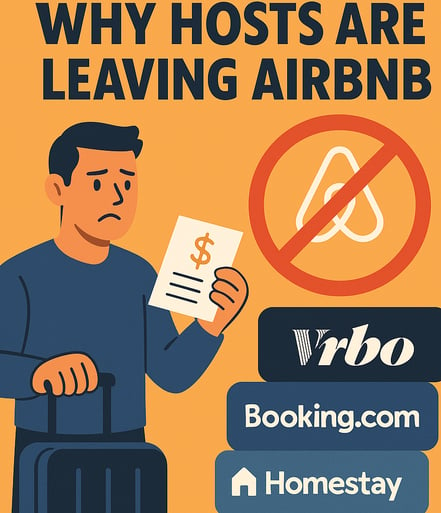Why Hosts are Leaving AirBnb
Discover why more property hosts are turning away from Airbnb in 2025. From rising fees and inconsistent support to new regulatory pressures, this article explores the key reasons behind the shift—and highlights the best alternative platforms where hosts are finding more control, higher profits, and better guest experiences.
5/22/20252 min read


In recent years, a growing number of hosts have been stepping away from Airbnb, citing various challenges that have made the platform less appealing. From increasing fees to inconsistent support, the reasons are multifaceted. As hosts seek more favorable conditions, several alternative platforms have emerged, offering different advantages.
⸻
Why Hosts Are Leaving Airbnb
1. Rising Fees and Reduced Earnings
Airbnb’s fee structure has become a point of contention for many hosts. The platform typically charges hosts a 3% service fee, while guests may pay up to 14.2%, depending on the reservation subtotal. These fees can erode the profitability of hosting, especially when combined with other costs like cleaning and maintenance.
2. Inconsistent Support and Policy Changes
Hosts have expressed frustration over Airbnb’s customer support and policy enforcement. Instances of sudden policy changes, lack of support during disputes, and perceived favoritism towards guests have led some hosts to feel undervalued and unsupported.
3. Regulatory Challenges
In cities like New York, stringent regulations have made it increasingly difficult for hosts to operate legally on Airbnb. These challenges have prompted hosts to explore platforms that either assist with compliance or focus on markets with fewer restrictions.
4. Ethical and Political Concerns
Some hosts have taken issue with Airbnb’s corporate decisions and affiliations. For instance, reports of co-founder Joe Gebbia’s involvement with controversial political initiatives have led certain hosts to dissociate from the platform on ethical grounds.
⸻
Alternative Platforms for Hosts
1. Vrbo (Vacation Rentals by Owner)
Vrbo specializes in whole-home rentals, catering to families and larger groups. The platform offers features like customizable cancellation policies and damage protection options.
2. Booking.com
Originally a hotel booking site, Booking.com has expanded to include vacation rentals. It boasts a vast global audience and offers instant booking, making it attractive for hosts seeking high visibility.
3. Savvy
A newcomer to the vacation rental scene, Savvy differentiates itself by not charging service fees to hosts or guests. Instead, it offers optional subscriptions to enhance listing visibility.
4. Homestay
Focusing on cultural exchange, Homestay connects travelers with hosts who offer a more personal experience. It’s ideal for those looking to host guests for longer stays and foster meaningful interactions.
5. Direct Bookings
Some hosts are opting to create their own websites to manage bookings directly. This approach allows for complete control over pricing, policies, and guest communication, eliminating third-party fees.
⸻
As the short-term rental landscape evolves, hosts are reevaluating their platforms of choice. While Airbnb remains a significant player, the emergence of alternative platforms offers hosts more options to align with their values, financial goals, and desired level of control.
Location
Moo 1 Koh Samui, Thailand 84320
Hours
I-V 9:00-18:00
VI - VII 9:00-16:00

